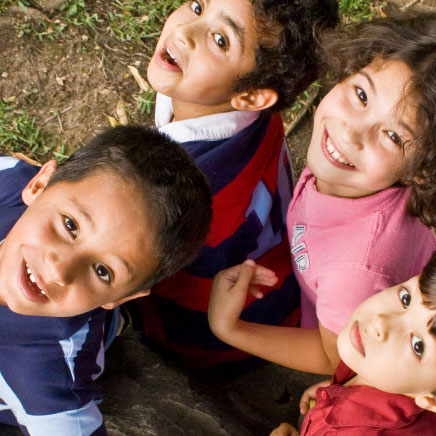At Coram-i, we share expertise with local authorities and other agencies, using a data-led approach to deliver better outcomes for looked-after children. Through our pioneering improvement work and long-term partnerships, we provide support to local authorities, ensuring they are better equipped to achieve permanency for looked-after children.

How we help local authorities
We are committed to helping vulnerable children have the best possible chance to live a fulfilling life. We work with local authorities that want to improve how they deliver children’s services. We offer a range of consultancy services that help local authorities to:
- achieve better performance against government scorecards and Ofsted inspection judgements
- develop innovative solutions to intractable problems, in partnership with other local authorities and private sector partners
- gather young service users’ views to inform service development
- increase staff productivity, satisfaction and effectiveness
- reduce resources spent supporting looked after children as a result of earlier permanence placements
- access more accurate and timely management information
- increase service-user satisfaction
- progress complex cases
We support local authorities to strengthen their work in adoption, fostering and special guardianship arrangements. We offer a range of services including consultations; support and coaching; embedded working within a team; and service management, delivery and integration. Find out more using the dropdowns below.
Tools and improvement services
Coram Innovation Incubator
Improving outcomes for vulnerable children through innovation
The Coram Innovation Incubator (CII) is a space and vehicle for generating, testing and scaling (i.e. incubating) new approaches to the most important and intractable challenges in children’s services as defined by the providers of those services. The CII benefits from the expertise, capacity and know-how of our external partners, Ernst & Young and Microsoft, as well as its members. Bringing together groups of local authorities and public bodies that share a common challenge, leveraging private sector partners and combining the collective wisdom and ideas to create and test ground-breaking innovations will lead to a stepped change in the way services operate and more importantly, improve outcomes for children.
The incubator is about the art of the possible: working in partnership on a range of complex challenges for children and creating the capacity for change in organisations and the sector.
The Children's and Social Care Secretariat
Coram-i was contracted to provided a Secretariat service to the ASGLB between July 2019 and December 2022, which included administering quarterly data collection and Board meetings. The ASGLB has now been closed, but we continue to administer the voluntary, quarterly adoption and special guardianship data collection on behalf of the children’s social care sector in England.
Improvement support
This consists of one-off consultations or longer term support. Our approach is tailored to your needs and we offer a full range of solutions. The different types of improvement support include:
Specialist consultations: Our experienced multi-disciplinary team, including social workers, psychologists and psychiatrists, can provide one-off, case focused discussions to enable agreement on care plans; or advice about the way forward in complex cases, such as sibling separation or placement of older children who have suffered disruption. We also conduct audits of case files.
Support and coaching: Working with staff, we will introduce new ways of operating that will improve performance in line with the national agenda.
Embedded team: Our staff will work within your service to support its delivery and role model how to work effectively.
Managed service: By taking on the management of a particular service within the local authority, Coram-i will share responsibility for the service.
Delivered service: Providing the delivery of the service on behalf of a local authority.
Integration services: Helping with the integration of multiple agencies, based on what we have learnt from the creation of agencies such as Coram Cambridgeshire Adoption Agency.
Adoption service diagnostics
We use the diagnostic to identify differences in the types of children under the responsibility of the local authority; drift in children’s adoption journeys and analyse the possible reasons for long care journeys; drift in adopters’ journeys and possible reasons for delays; calculate the productivity rate of services in placing children and recruiting adopters; and calculate unit cost of placing a child for adoption.
Legal deep dive
The aim of the legal deep dive is to provide a quantitative analysis of care planning and court processes for young children in a local authority. From this we develop hypotheses about the reasons for blockages and delay, and suggest areas of improvement in social work and legal planning.
Tracking tool
The Coram-i Tracking Tool has been developed to support adoption agencies in ensuring they have accurate, up-to-date data on the children and prospective adopters, and to provide managers and staff with the information they need to deliver a high quality service.
This tool will give managers and staff meaningful data that will help them manage their cases and keep track of performance. It has been designed through our improvement support work to meet the needs that existing ICS do not. It will complement an ICS and so will be particularly invaluable to any agencies that are integrating their services.
Bright Spots
Local authorities supporting positive wellbeing and care experiences for the children and young people they look after
The Bright Spots programme is a partnership between Coram Voice and the University of Bristol that aims to improve the well-being of children in care by identifying and promoting practises that have a positive influence on children and young people’s well-being.
The key objectives of the programme are to:
- Understand, from a children in care and care leavers’ perspective, the key elements of well-being and how this compares to children and young people in the general population
- Measure the well-being of children in care and care leavers
- Promote an understanding of what well-being and a positive care experience is for children in care and care leavers
- Identify those local authorities where children and young people have greater well-being
- Deep dive to identify the ‘bright spots’ – the practices and policies that contribute to children and young people’s well-being
- Support local authorities to improve children and young people’s well-being
- Influence national policy to drive improvements in children and young people’s wellbeing
The Storyteller App: Empowering children in care to own their stories forever
Storyteller is a place where content can be collated and curated for, with and by children in care. Anyone important to the child can upload images, record video and audio clips, plus add text messages for a child to own forever.
Discover the Storyteller App
How we work
We employ a data-led approach to analyse performance and identify areas for improvement, using our specialised improvement framework and diagnostic tools. We also draw on our experience of improving the lives of children to shape and deliver solutions.
Our unique multi-skilled teams of practitioners include social workers, psychologists, psychiatrists, analysts and other professionals. This means we can tackle problems on several levels, enabling us to determine the nature and scale of problems and effective solutions.
Our Coram-i team will be happy to answer your questions about our consultancy services, and how we can work with your local authority to achieve the best possible results for children. Please complete our online form with your enquiry or contact us directly on coram-i@coram.org.uk.

News and blogs
Explore our latest news and blogs on innovation

Resources
View and download our helpful resources and reports
